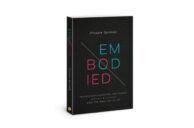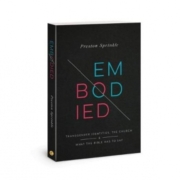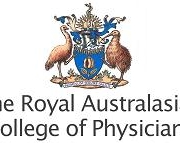A Go-To Resource for Christians on Transgender
 I first became properly aware of the reality of gender dysphoria and transgender about five years ago. I learnt about what gender dysphoria is and how painful and debilitating it can be. I gained some level of insight into the identity questions and desire for community that are often part of the transgender experience, and I read about the unhelpful and unloving responses that Christians had often made. I was learning, but it also did something in my heart.
I first became properly aware of the reality of gender dysphoria and transgender about five years ago. I learnt about what gender dysphoria is and how painful and debilitating it can be. I gained some level of insight into the identity questions and desire for community that are often part of the transgender experience, and I read about the unhelpful and unloving responses that Christians had often made. I was learning, but it also did something in my heart.
I remember being struck that the church experience of those who had gender dysphoria or who identified as transgender was somewhat parallel to my own experience as someone who is same-sex attracted: misunderstood, used as the butt of jokes, spoken of as if we only exist outside of the church, and often just not acknowledged at all. At that point, things were beginning to change a bit for same-sex attracted people, but it seemed the journey was only just starting for transgender people. From that point, I started a journey of reading, talking, and wrestling with difficult questions, which then flowed into opportunities to teach others and call them to a truly Christian response to transgender, which holds fast both to God’s heart and God’s truth.
In those five years, several good Christian books on transgender have been published, and I’m grateful for them. But I’ve also felt each has its weaknesses, unsurprisingly when we’re talking about such a complex and controversial topic. There has still been a need for an accessible but comprehensive Christian discussion of transgender, which isn’t afraid to wrestle with the difficult questions and to hold unswervingly to God’s good word, but which also puts front and centre those for whom this is not just an abstract topic, it’s real life. Well, we now have that book.
The Most Helpful Christian Resource on Transgender
Embodied: Transgender Identities, the Church, and What the Bible Has to Say by Preston Sprinkle is without question the most helpful Christian resource now available on transgender. As in his earlier book on same-sex attraction—People to be Loved: Why Homosexuality Is Not Just An Issue—Preston does not approach the topic as an abstract issue, but with full recognition that when we talk about transgender, we are talking about people made and loved by God. I know no one else who so wonderfully follows Jesus’ example of holding together the radical truth of God with the radical love of God. And Preston writes not only from his extensive research (which really is extensive—there are 42 pages of endnotes!) but also from his own experience of friendship with those for whom this is real life.
The ground covered in Embodied is impressive. The transgender conversation is hugely complex with many different parts to it, but Preston manages to engage with all the most important topics, giving the reader a good orientation to a Christian perspective on the whole conversation without it feeling overwhelming.
Broadly speaking, the book falls into two parts. The first part tackles the most fundamental question in the conversation: ‘If someone experiences incongruence between their gender and their biological sex, which one determines who they are—and why?’ (p.24). Over several chapters, Preston helps us understand the diversity of experiences under the broad umbrella of transgender, looks at what it means to be created male and female in God’s image, and considers some of the various ways that Christians have sought to understand this experience of incongruence (including the Bible’s references to eunuchs, intersex conditions, brain sex theory and the possibility of incongruence between the body and soul). This section also includes a hugely helpful chapter on gender stereotypes in which Preston presents an excellent challenge to Christians and the Church about our commitment to unbiblical stereotypes that can be hugely detrimental to many people.
The second half of the book turns to consider some of the most practical questions within the transgender conversation, including pronouns, single-sex spaces and the controversial phenomenon of rapid-onset gender dysphoria among children and teenagers. The standout chapter in this section is ‘Transitioning and Christian Discipleship’, in which Preston tackles the most difficult question of all: ‘Should a Christian ever transition?’ He navigates this complex matter with incredible humility, love, and faithfulness to God’s word. The book ends with a very helpful appendix on suicidality, offering some sensitive and level-headed reflections on what is an important but often badly handled area of the transgender conversation.
A Book for Everyone
Many people are intimidated by the complexity of the transgender conversation, but Preston writes in his usual relaxed, conversational tone and makes a complex topic much more manageable.
If you’re a church leader or a youth leader, you need to read this book. Don’t wait until you feel you need to read it; read it now, so you are ready to best love and serve those God brings to you.
If you’re a doctor or other frontline medical professional, you will be helped by the book. Read it to understand the variety of experiences that may be a reality for those you get to care for and to allow God to shape your heart so that you can express his heart when caring for people who are trans.
If you’re a Christian, you should read this book. You should read it to learn how to respond in a Christian way to transgender people whom you may know or may come to meet, but also to see an example of how we can handle some of the most complex and controversial of cultural conversations in a way that embodies the example of Jesus.
If you’re trans, whether you’re a Christian or not, I’d encourage you to read this book. You will find a guy who has done his best to understand something of what life is like for you while acknowledging that there are things he can never fully understand in the way you do and who will make you feel seen and loved even as you read, and who, most importantly, will seek to introduce you to the one who knows you and loves you more than any person can.
I am so grateful for this book. My prayer is that God will use it to shape churches that can be family to those wrestling with their gender identity, to stir Christians who will give themselves to loving others as Jesus loves, and to reveal to those who experience gender dysphoria or who identify as transgender the depths of his love for them and his unfailing goodness.
This review has been adapted from a post originally published at thinktheology.co.uk
Andrew Bunt is a pastor, speaker and writer, and an associate at Living Out.









Leave a Reply
Want to join the discussion?Feel free to contribute!